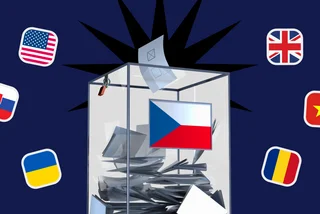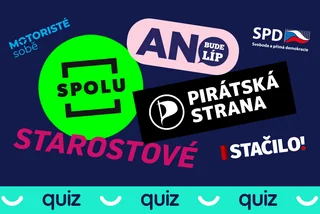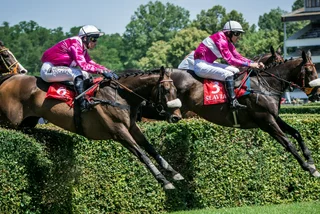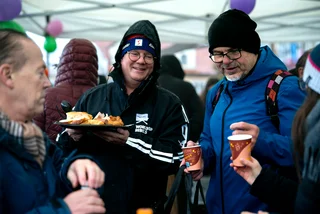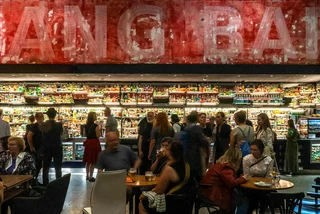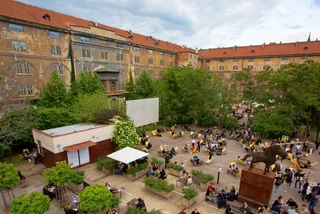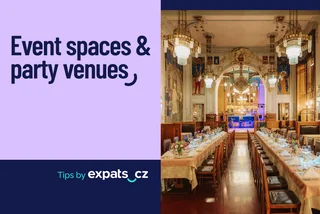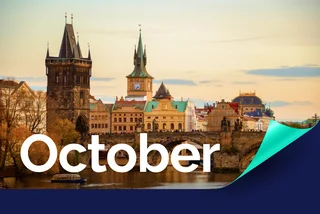Introducing the new podcast from Expats.cz, Expats Extra. Think of it as the cutting board of our newsroom—where snippets from our stories, behind-the-scenes reporting, and surprising soundbites come together each week. You can listen to the podcast on Spotify, Apple Music, or Podbean.
SHOWNOTES Bits and bytes for October 2025
- Franz director Agnieszka Holland on the film’s fragmented approach
- Trupa Trupa on NPR’s Tiny Desk Concert
- Read the Prague Reporter’s review of Franz
- Where to catch Franz with English subtitles
- Read more about how, where, and why to vote via the Elections for All initiative
- Strahov Monastery is currently serving up its autumnal ales
Transcript
ELIZABETH:
What happens when Franz Kafka meets Iggy Pop's favorite band? This is Expats Extra. Today, we're cranking up an unexpected soundtrack choice, discovering why Czechia’s Autumn brews beat Munich's crowds, and hearing from a new Czech citizen about to head to the polls.
This is Expats Extra, a news podcast from Expats.cz. Fresh stories, surprising soundbites, hidden gems and extra insights beyond the headlines. It's October 2nd, and I'm Elizabeth Zahradnicek-Haas, editor of Expat.cz. This week we're talking to a newly naturalized Czech citizen casting his vote for the first time. We'll also discover what authentic Oktoberfest actually tastes like. But first, digital editor Anica Mancinone has your first listen to the music of Franz, the new Kafka biopic, in Czech cinemas now.
'Kafka would have loved them': A soundtrack for Franz
ANICA:
You're listening to ‘Looking For’ by the Polish band, Trupa Trupa, part of the soundtrack to Agnieszka Holland's new Kafka biopic, Franz, now in Czech cinemas. Fans of the band include Iggy Pop and Henry Rollins. At first, a jagged post punk soundtrack might seem like an odd match for a writer from the early 1900s. But Kafka's skepticism toward authority, his outsider perspective, his sense of unease in everyday life–you can hear it in distorted guitars and driving rhythms.
The choice makes sense. Lead singer Grzegorz Kwiatkowski isn't only a musician, he's also a human rights activist, historian and poet. His work explores memory and trauma from the Holocaust to Poland's communist past.
GRZEGORZ:
For me, looking at history was always like, ‘wake up', you know, please try to be a good person, you know, good husband, good wife, good father, you know, just try to not judge everything and criticize everyone.
ANICA:
Director Agnieszka Holland says she loves Trupa Trupa, calling Grzegorz a poet. She says their music expresses the energy and freedom she looks for in cinema, and that Kafka himself would have loved them. Shot mainly in Prague and starring Idan Weiss as the Jewish writer, Franz is already being hailed for its kaleidoscopic storytelling. Here's Agnieszka Holland speaking to the San Sebastian International Film Festival.
AGNIESZKA:
And they knew that his life and his literature is not open to the classical, biographical, linear, you know, story—that it has to be in fragments, in puzzles.
ANICA:
Trupa Trupa's sound, a blend of post punk psychedelia and lyrical intensity, has been described by The Hollywood Reporter as the sonic glue holding this fractured portrait together. The music mirrors Kafka's restless, often nightmarish world and makes it feel surprisingly modern. After all, who hasn't felt like a workaholic, an introvert, an outsider or just someone trapped in a desk job nightmare?
How naturalized citizens could reshape election outcomes
ELIZABETH:
What does democracy sound like? In some places, it's the electronic beep of a touch screen. Elsewhere, the satisfying clunk of a lever or a pencil scratching on paper. But in Czechia, democracy sounds like a thin sheet of paper sliding into an envelope and being dropped through a slot. For most Czechs, knowing what to do at the polls is routine, but this weekend, a surge of naturalized Czech citizens will participate in their first parliamentary election.
Their votes could shape results, but many don't yet know their rights or even how to handle a ballot. Among those first time voters is Juryj Laurencjev, a 36 year-old tech professional from Belarus. After living in Czechia for more than a decade, he gained citizenship last year. He'll be casting his first ballot this October, joining a growing demographic that advocacy groups say could sway elections in cities like Prague, with large populations of voters with migrant backgrounds.
JURYJ:
I've been living here for 13 years. It's my home, I want to be part of this country. So it's definitely exciting to be part of real elections where even my one vote would result into something.
ELIZABETH:
The numbers are striking. Since 2019 nearly 29,000 people have gained citizenship. In 2023 alone, more than 6,300 people became Czech citizens. Yet many new citizens stay away from the polls. That's where organizations like ‘Volby pro Všechny, Elections For All’ come in. Dutch political scientist Suzanne Verhaar co-founded the group. It started as expats debating politics and pubs and grew into something more.
SUZANNE:
The language will always be an issue. A lot of people come from countries where there is less of a democratic tradition, so it's just not in their system. And, it's also the local electoral system here. Like, how does that work?
ELIZABETH:
For Juryj, the act of voting is about more than policies. It's about belonging.
JURYJ:
Quite a lot of people say, ‘yeah, do I really have a moral right to participate? I'm a new person here, they know this country.’ I've heard a lot of people saying that. That's why we wanted to do something with that and motivate people to actually come to elections and to overcome those rejections.
ELIZABETH:
That influence is only set to grow. Next year, about 70,000 EU citizens and nearly 5000 to 10,000 new citizens will be eligible to vote in local elections. For Juryj, who grew up in Belarus, where elections are little more than theater, this moment feels especially powerful.
JURYJ:
When I was saying, ‘Oh, my one vote doesn't count,’ my best argument against that is that actually, when it's calculated, each party gets a certain amount of money for each vote.
ELIZABETH:
Suzanne, who isn’t yet a citizen herself, says participation is still vital, even for those who can’t vote.
SUZANNE:
We might not speak Czech very well or at all, but we are still part of this community. We work here, we add to the economy, we buy our stuff, we bring culture in and arts and innovation and you are part of this community.
ELIZABETH:
And if you can't vote, she says encouraging friends or family to do so is just as important.
SUZANNE:
The science behind ‘how do you get people to vote’--the top factor in impacts is just one-on-one contacts. Somebody asking you or telling, like, ‘Hey, you're going to vote, right? Ah, you have elections. You go vote.’ ‘Yeah, I know, I cannot vote, but you vote.’
ELIZABETH:
Czech elections take place October 3rd 4th. If you'd like to learn more about the issues, the parties and your voting rights as an immigrant, visit Expats.cz.
Oktoberfest, the Czech way
THOMAS:
Why do millions chase overpriced beer in Munich's crowded tents? A 400-year-old monastery brewery in Prague is quietly serving what Oktoberfest used to taste like before commercialization changed everything.
High above Prague at Strahov monastery, brewer Marek Kocvera isn't just pouring beer. He's preserving brewing traditions that predate Bavaria's famous festival by two centuries. Here's something that might surprise you. Czech brewing traditions go back much further than Oktoberfest's 1810 origins. Here's brewer Marek Kocvera from Pivovar Strahov.
MAREK (TRANSLATION):
Both countries have a strong historical tradition and the dominance of bottom-fermented beers. But, the differences come down to variety.
In the Czech Republic, light lagers dominate. There's a huge diversity in Germany. Helles, Pils, Weizen, Märzen, Kölsch, Altbier, Rauchbier, Berliner Weisse and Bock.
THOMAS:
In fact, both Czechia and Germany share a deep tradition of beer as a social cornerstone.
MAREK (TRANSLATION):
Beer is a part of every day culture. Pubs are social centers and drinking beer is more of a cultural act than just alcohol consumption.
THOMAS:
In Czechia, that tradition still shapes daily life. While in Germany, the sheer scale of Munich's modern festival has transformed it into a tourist spectacle, altering its original style and atmosphere. At Strahov, Autumn brings fresh hop season, and that's where Czech brewing truly shines. The monastery's antidepressant dark lager uses zahtechki, polorani, cherveniak hops, creating a beer similar to German dunkel, but with a distinctly Czech character.
MAREK (TRANSLATION):
Our Festbox has a semi-dark color and is based on the original Martin beers served at Oktoberfests until the 1930s unlike the lighter beers you'll find in Munich today.
THOMAS:
While mass-produced festival beers prioritize consistency and volume, monastery brewing follows the rhythm of harvest seasons. Fresh hops create flavors that can't be replicated year round or mass-produced. Czech hops, have supplied breweries worldwide for centuries. Yet here in Prague, they're creating beers that honor both German brewing techniques and Czech terroir.
MAREK (TRANSLATION):
Autumn in the Czech Republic is associated with beers brewed from freshly harvest hops, which would certainly deserve a separate celebration.
ANICA:
That’s all for this week’s episode of Expats Extra, where we bring you fresh stories, surprising sound bites and insights beyond the headlines. For all the links, details and the bits and bytes we mentioned in today's episode, head over to Expats.cz. This episode was written, edited and produced by Elizabeth Zahradnicek-Haas, Anica Mancinone and our intern, Alexis Carvajal, with contributions from Thomas Smith and Daniel Zahradnicek. Follow Expats Extra wherever you get your podcasts, so you never miss a story.



